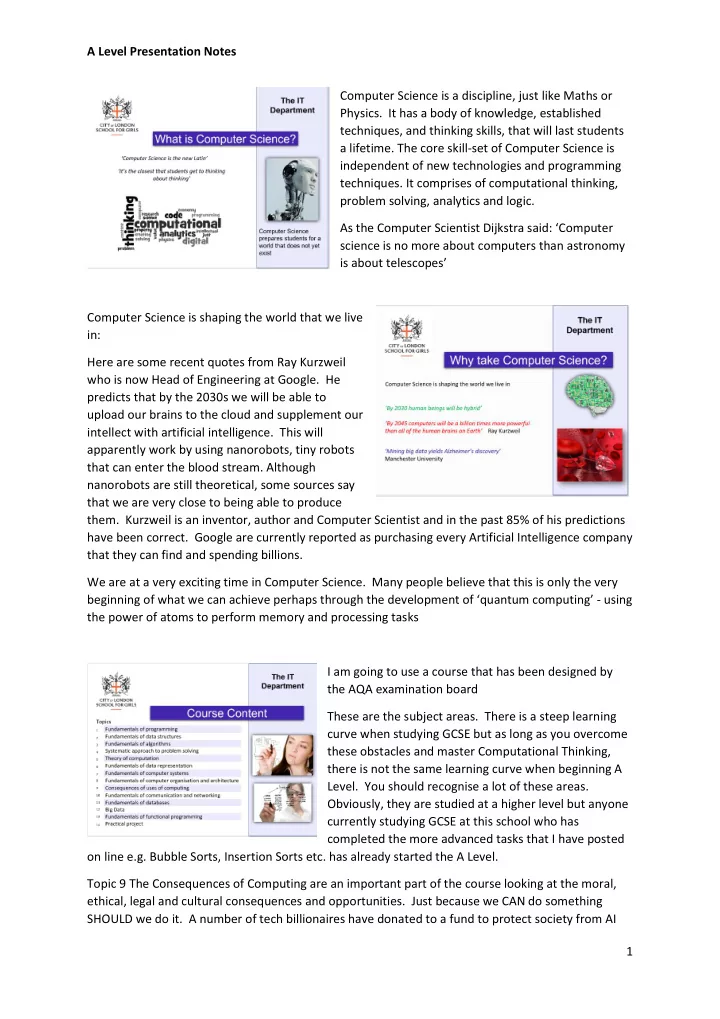

A Level Presentation Notes Computer Science is a discipline, just like Maths or Physics. It has a body of knowledge, established techniques, and thinking skills, that will last students a lifetime. The core skill-set of Computer Science is independent of new technologies and programming techniques. It comprises of computational thinking, problem solving, analytics and logic. As the Computer Scientist Dijkstra said: ‘Computer science is no more about computers than astronomy is about telescopes’ Computer Science is shaping the world that we live in: Here are some recent quotes from Ray Kurzweil who is now Head of Engineering at Google. He predicts that by the 2030s we will be able to upload our brains to the cloud and supplement our intellect with artificial intelligence. This will apparently work by using nanorobots, tiny robots that can enter the blood stream. Although nanorobots are still theoretical, some sources say that we are very close to being able to produce them. Kurzweil is an inventor, author and Computer Scientist and in the past 85% of his predictions have been correct. Google are currently reported as purchasing every Artificial Intelligence company that they can find and spending billions. We are at a very exciting time in Computer Science. Many people believe that this is only the very beginning of what we can achieve perhaps through the development of ‘quantum computing’ - using the power of atoms to perform memory and processing tasks I am going to use a course that has been designed by the AQA examination board These are the subject areas. There is a steep learning curve when studying GCSE but as long as you overcome these obstacles and master Computational Thinking, there is not the same learning curve when beginning A Level. You should recognise a lot of these areas. Obviously, they are studied at a higher level but anyone currently studying GCSE at this school who has completed the more advanced tasks that I have posted on line e.g. Bubble Sorts, Insertion Sorts etc. has already started the A Level. Topic 9 The Consequences of Computing are an important part of the course looking at the moral, ethical, legal and cultural consequences and opportunities. Just because we CAN do something SHOULD we do it. A number of tech billionaires have donated to a fund to protect society from AI 1
A Level Presentation Notes Fundamental's of Algorithms refers to a more in depth study of algorithms and their efficiency usually undertaken in year 2. Discrete maths is now a bigger part of the syllabus. Students will study how: • To simplify Boolean expressions so that circuits can be designed using less logic gates • To find the shortest path using Dijkstra’s algorithm in Graph Theory to get an understanding of how devices like SatNavs work • To use Big O to compare algorithms in terms of efficiency • To manipulate vectors and matrices for example, in order to change sound and image files We no longer have AS and so all assessment is at the end of year two, although students will still take an internal AS style exam at the end of Year 1. You can see from this table that coursework accounts for 20% of the qualification. The on-screen exam requires the students to code in Python. They are given a skeleton programme to study a few months before the exam and they have to extend it in exam conditions. 2
A Level Presentation Notes Number one is the most important. I am going to use a range of software and mobile apps so each student will be issued with a Surface Pro 4 for the duration of the course. This will ensure that all students have the correct software installed. The students will also be given an Office 365 account. All of the resources for the course will be available online on my Virtual Learning Environment Computer Science Joke 3
Recommend
More recommend